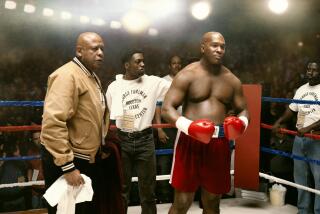A consumer’s guide to the best and worst of sports media and merchandise. Ground rules: If it can be read, played, heard, observed, worn, viewed, dialed or downloaded, it’s in play here.
- Share via
What: “Without Limits”
Where: Southland theaters
First to the finish may well be the golden rule of track, but it is not always the best policy when it comes to making movies about track.
In the runoff of the dueling Steve Prefontaine biopics, “Prefontaine” beat “Without Limits” to the big screen by more than a year, stirring a brief buzz of enthusiasm that ultimately faded upon reflection, leaving behind the aftertaste of not-quite-fulfilled potential.
“Without Limits” took its time, delaying an original April release date to further distance itself from the memory of “Prefontaine” and dipping into a creative reservoir its precursor could never match.
“Prefontaine” was the low-budget, outsider interpretation of the story. It had the look and feel of a well-intentioned made-for-TV movie, complete with Jared Leto of “My So-Called Life” in the starring role. “Without Limits” gets the full Official Hollywood Treatment--with Tom Cruise producing, Robert Towne directing, Billy Crudup portraying Prefontaine and Donald Sutherland taking on the pivotal role as Bill Bowerman, the legendary and eccentric University of Oregon track coach.
“Without Limits” also benefits from the cooperation of Prefontaine’s former girlfriend, Mary Marckx, and ex-teammate Kenny Moore, who wrote the script with Towne, lending invaluable insight into the Prefontaine-Bowerman relationship, which is really the crux of the movie.
Crudup, uncanny in his physical resemblance to Prefontaine, and Sutherland, thoroughly relishing the tics and quirks of his enigmatic character, make the film. They bicker over seemingly every issue, large and small--especially Prefontaine’s insistence at running every race full-out, rather than pacing himself for a stronger finish that would, in the end, lop seconds off his finish time.
Neither Prefontaine film, however, is comfortable with the circumstances surrounding the runner’s death in a 1975 automobile crash. Both gloss over the fact that Prefontaine’s blood-alcohol level was over the legal limit; “Without Limits” imagines Prefontaine spending his final moments behind the wheel fantasizing over the perfect three-mile run, as if the sheer rapture of a 63-second first lap could cause him to lose control of the car.
Unfortunately, pure and accurate history, unlike Hollywood myth-making, has its limits.
More to Read
Only good movies
Get the Indie Focus newsletter, Mark Olsen's weekly guide to the world of cinema.
You may occasionally receive promotional content from the Los Angeles Times.










